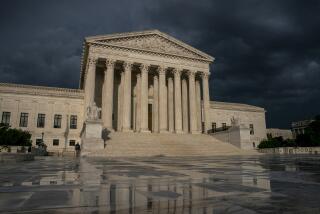WILLIAM REHNQUIST
- Share via
I read Savage’s lengthy story on Rehnquist with great disappointment.
In discussing the prospect of the Rehnquist court limiting further expansion of the Miranda precedent, Savage notes, without any empirical data, that criminal convictions are overturned only “on occasion” because of this technicality. Many prosecutors and police officers might take issue with that bald assertion. During my days as a prosecutor, I personally handled cases where confessions were suppressed from evidence and dangerous felons were acquitted for crimes they committed because of some technical Miranda deficiency.
Savage also states that “most historians disagree” with Rehnquist’s opinion that there is no constitutional mandate for a “separation of church and state.” Again he presents no sources or evidence to support this broad claim. But a cursory review of basic American history is to the contrary: For example, the origin of the phrase “separation of church and state” is nowhere to be found in the Constitution. And both houses of Congress established, over two centuries ago, and still fund, a chaplain to open each session of Congress with an invocation.
I do not cite these examples to argue for or against church and state fusion, but to show that Rehnquist’s opinion is based on precedent and not preconception.
I originally read the article to learn about the chief justice, not the author. When I was finished, I had learned a little about each of them.
JAMES E. ROGAN
MUNICIPAL COURT JUDGE, GLENDALE
More to Read
Sign up for Essential California
The most important California stories and recommendations in your inbox every morning.
You may occasionally receive promotional content from the Los Angeles Times.













